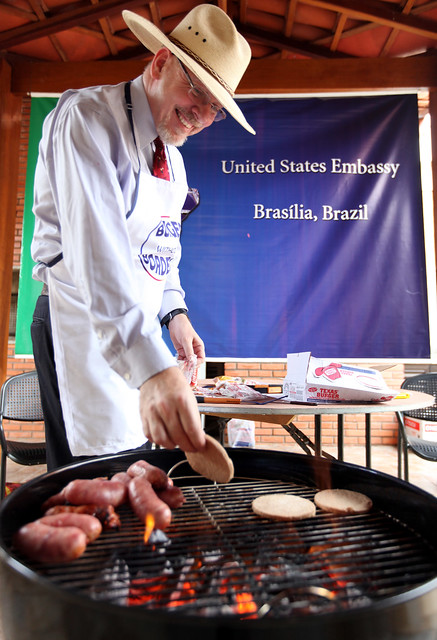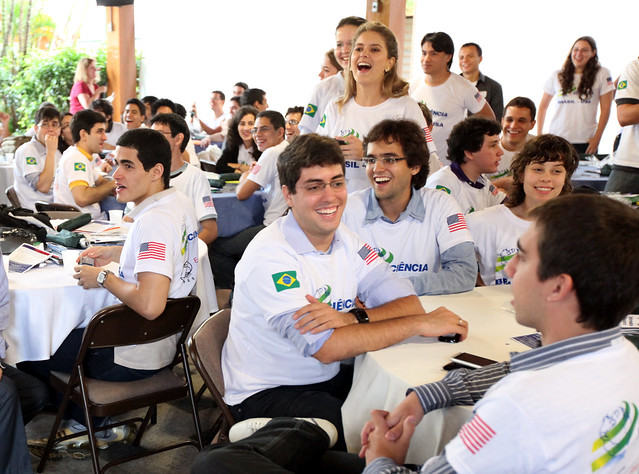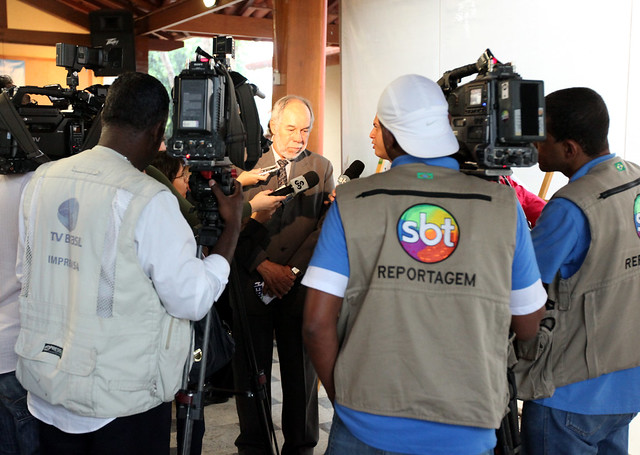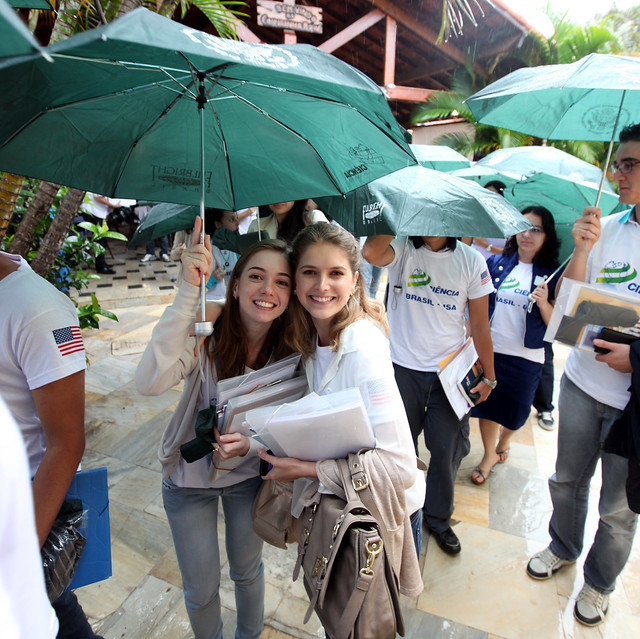
I would call it a public diplomacy triumph & I don’t think it is hyperbole to say so. We held “visa days” in Rio, São Paulo & Brasilia for student going to the U.S. on Science w/o Borders scholarships. There were about 600 served today. The Brazilian government estimates that they will have sent 1500 to the U.S. by summer and more from then on thousands more.
In Brasilia, we held a big event to talk to them about the U.S. and get them ready to go to the U.S. They will be spread out all over the U.S.
We called our event “Burgers w/o Borders.” The Ambassador and other American officers cooked and served hamburgers, American style, on a fried on a Webber grill. (I cooked too, as you can see in the picture.) Our goal was to create an American style cookout.
Always I try to learn from our successes as well as our failures and so I have been thinking about this. Getting this first wave of Brazilians to the U.S. only a few months after the Brazilian president announced the outlines of the program is a definite success. In the midst of such success, we need to determine the role of our team. How different would be the outcome if we did things differently? We don’t want to be like the rooster taking credit for the sunrise, but we also don’t want to attribute to luck what was influenced or even shaped by our efforts. You cannot learn from experience if you take credit for everything or take credit for nothing.
Results are important, but the only way to improve is to study the process that went into the results. The challenge is when we study the process already knowing how the story ended. Knowing the outcome, we work backwards, emphasizing events that seem to have contributed to what we know happened, but may not have done so, may not be duplicable or may not be recognizable in advance. Some people say that hindsight is 20/20, but this overestimates our ability to understand the real processes and underestimates our tendencies to tell good stories and create narratives even where they don’t exist. Our stories usually overestimate deliberate actions of individuals involved, undervalue the importance of interactions among actors and neglect almost entirely the role of random events. We also tend to emphasize our own contributions. This is not only because we are egocentric, but also because information about our own actions is more readily available to us. With those caveats in mind, I am thinking through the process.
I have written earlier about the larger program, Science w/o Borders. You can read about it here. I won’t repeat. Let me talk here specifically about our visa days/Burgers w/o Borders, the reception we gave the students that made it an event, marked a transition, and created an impression.

First let me be open about what I think I can take credit for doing (caveats above applying). I take credit for taking this program seriously and conveying the urgency to colleagues around Brazil. I knew where we wanted to be. Leadership is intangible in many ways. Big successes or failures often look impossible before they happen, but then inevitable after the fact. By extension the person pushing it sometimes seems nuts before and irrelevant after. That was my role (yes – to seem nuts before & irrelevant after, and I did it well.) I didn’t let things slip, pushed for success and let everyone know that I would back them up. W/o this leadership, I am convinced we would not have achieved this result. In the bigger picture, w/o the Mission’s consistent, proactive support, I do not believe the students would have gone this semester. We would have had a trickle in the fall semester and it would have seemed to be the natural outcome.

“My” biggest contribution was putting the right people in the right places and letting them do what they were good at doing. I have been teaching my Brazilian colleagues the use of the word “honcho” both as a noun and a verb. I use it in a particular fashion. For me the honcho, or the person honchoing, does what is needed to make something work. He/she doesn’t always have specific power he/she is working with in other cases and has to enlist cooperation through a variety of persuasion and power methods.
I asked my colleague Lana to honcho the logistics of the program at the Embassy. She did a great job of coordinating the work of others. I think it is important that the big boss (i.e. me in this case) back the honcho, but not be in charge of details. This gives the actual honcho the ability to refer to higher authority and strengthens his/her ability to implement. You would think that having the ability to make the final decision would be strength, but it is often weakness. IMO, we in State often make decisions at too high a level and/or with too much consensus. My father told me that I should never spend a dollar to make a nickel decision. The honcho can make decisions with the cover of the big boss using the resort to higher authority if there are problems (i.e. can say “I would like to do it, but you know how the boss is.”)
(It is very important that if we delegate responsibility, we also need to delegate authority for most decisions and freedom to make them. I hate it when someone gives responsibility and then comes back to second-guess or revisit all the decisions. Good leaders, IMO, add value by asking good questions and sharing experience when appropriate. Bad leaders subtract value by “taking charge” of details or “holding people accountable” while not giving them enough freedom to be responsible. I am aware that I also suffer those faults and try tread lightly on working systems. I think of good leadership in forestry terms: know the environment; plant the right trees; thin and trim as appropriate; protect them from pests them; give them enough but not too much fertilizer to grow and let the system develop, all the time accepting that it is more complex in its details than you can understand.)

Another important “small” success was giving the program a catchy name. A project with a good name is almost always done better than one w/o one. We chose “Burgers w/o Borders” because it was a lighthearted parallel to “Science w/o Borders”. It also had the advantage of fitting the program and the beauty of alliteration. In other words, it is easy to say; appropriate and memorable in the sense that it evokes a concrete image.
My colleagues had lots of ideas about making the event memorable in other ways. We had T-shirts and umbrellas to make the pictures memorable. Look at the picture down of the crowd with the umbrellas. Now imagine it with just a couple people with ordinary clothes and no umbrellas. Look at my picture with the Burgers w/o Borders apron and the cowboy hat. Image makes a difference, doesn’t it?
On the day of the event, we put all hands on deck. There was some redundancy, but you need slack. Better to have someone standing around unneeded than have someone needed not standing by.
Media was willing to cover the event because it was an event. Our press section colleagues were able to sell the it using the hook of the cookout event. They could promise good visuals and interesting stories from the student. Of course, it didn’t hurt that Science w/o Borders had been in the news recently. A good PD rule of thumb is that you should not create your own wave when you can catch and ride higher on one that is already coming your way. People are interested in “their” events, not ours. We also encouraged the students to bring and use their cameras and cellular phones. Young people are natural creators on social media, but you need to create opportunities for them. Since Burgers w/o Borders was not in the Embassy proper, security let them keep their devices.
Of course, much of the success was created by others. Our Consular sections all over Brazil were keys to success. They were fantastically cooperative. After all, visa day required visas. As I alluded immediately above, our security folks were also very helpful and flexible. This was a case where we were lucky, lucky to have great colleagues. I really cannot “analyze” that, except to say that keeping colleagues in the loop, showing them respect and understanding their needs is essential in any cooperative endeavor, and this category includes almost all human activities.
Of course, our Brazilian friends will see it differently. From their point of view, WE are the support activity for their program and they are right. We are supporting their success. They are right too. It is a win all around, enough to go around.
P.S. Students arrived on buses and had to line up to get through security. A line is a great PR opportunity, as all politicians know. You have a captive audience eager for some diversion. I worked the line on the way in, stopping to talk to forty or fifty Brazilians on as individuals. I think this made a great impression on the students. We spoke in Portuguese outside the Embassy and then English inside to show the transition. We joked about the quality of my hamburgers and generally made the personal connection. I think this is something they will take with them and remember for a long time.
More pictures at the Embassy Flickr site.
